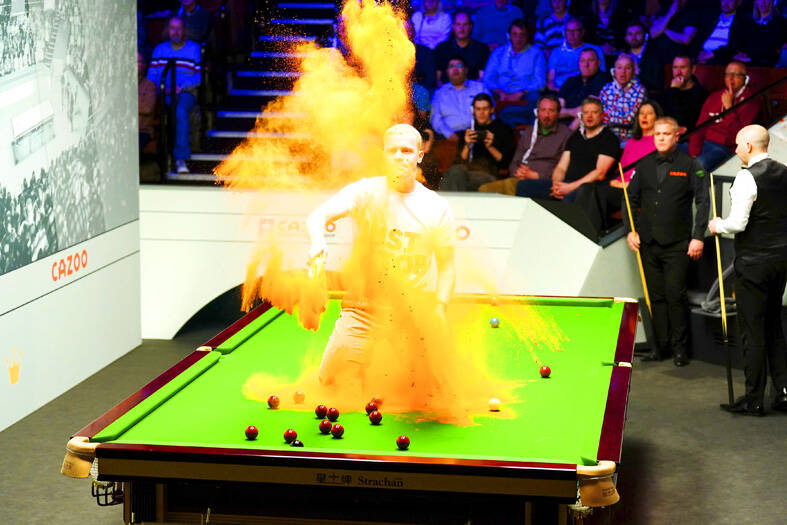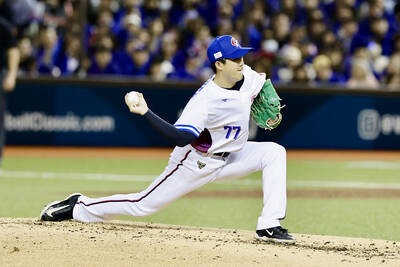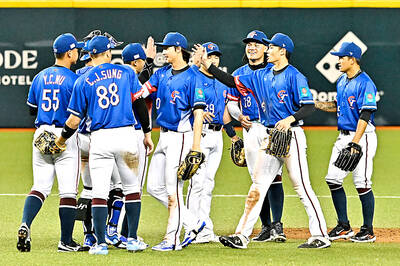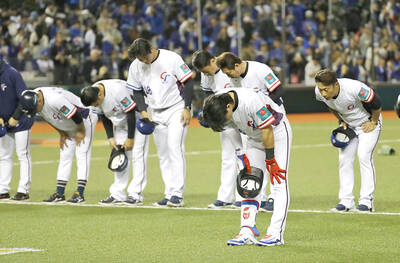The Crucible Theatre’s famous green baize turned orange at the World Snooker Championship on Monday when a protester interrupted a match by jumping on the table and releasing a packet of powder, causing play to be suspended.
Two “Just Stop Oil” protesters invaded snooker’s most famous arena shortly after play began in two matches in the evening session.
On one table, where Robert Milkins and Joe Perry were playing, a man leapt onto the table — scattering the balls — and threw orange dye over one half of the baize as boos and jeers came from the audience.

Photo: AP
On the other table, featuring a match between Mark Allen and Fan Zhengyi, a woman was stopped from getting onto the table by quick-thinking referee Olivier Marteel.
Just Stop Oil named those responsible as Margaret Reid, a 52-year-old former museum professional from northwest England, and Eddie Whittingham, 30, a student at the University of Exeter.
Former world champion Stephen Hendry, who was on commentary duties for the BBC, said it was a “scary” incident and feared the cloth on the table might not be able to be used again.
“For me, straight away as a snooker player I am thinking: ‘Is the table recoverable?’ We don’t know what that is on the table,” Hendry said.
Just Stop Oil issued a statement saying the protesters were removed from the Crucible and arrested.

Taiwan kept their hopes of advancing to next year’s World Baseball Classic (WBC) alive with a 9-1 victory over South Africa in a qualifier at the Taipei Dome on Saturday, backed by solid pitching. Taiwan last night played against Nicaragua. As of press time, Nicaragua was leading 6-0. Bouncing back from Friday’s struggles on the mound, when Taiwanese pitchers surrendered 15 runs to Spain, Team Taiwan on Saturday kept the visiting team in check, allowing just one run in the bottom of the fourth inning. Starting pitcher Sha Tzu-chen struck out one and allowed no hits, except for a hit-by-pitch over

Taiwan kept its hopes of advancing to the 2026 World Baseball Classic (WBC) alive with a 9-1 victory over South Africa in a qualifier at the Taipei Dome last night, backed by solid pitching. Bouncing back from Friday’s struggles on the mound, when Taiwanese pitchers surrendered 15 runs to Spain, Team Taiwan kept the visiting team in check, allowing just one run in the bottom of the fourth inning. The win was crucial for Taiwan, as a loss would have eliminated the team from contention for the next WBC. Starting pitcher Sha Tzu-chen (沙子宸) struck out one and allowed no hits, except for

Team Taiwan are set to face Spain in a win-or-go-home match tonight for the final berth at the 2026 World Baseball Classic (WBC), despite losing to Nicaragua 6-0 in the WBC qualifier at the Taipei Dome on Sunday. The home team’s loss on Sunday means Nicaragua finish first in the qualifier round in Taipei with a perfect 3-0 record and advances to next year’s finals. After crushing South Africa 9-1 earlier on Sunday, Spain took second place in the four-team qualifier with a 2-1 record. With a 1-2 record, Taiwan finished third while South Africa placed at the bottom with

Team Taiwan avoided missing the World Baseball Classic (WBC) for the first time by defeating Spain 6-3 in a do-or-die game in Taipei last night. After narrowly escaping a mercy-rule loss to Spain in the WBC Qualifiers opener on Friday last week, the home team — winner of last year's WBSC Premier12 title three months ago — got their revenge against the 2023 European champions at Taipei Dome. "It felt quite different from when we won the Premier12," Taiwan captain Chen Chieh-hsien (陳傑憲) said after the game, recalling the ups and downs the team has experienced over the past few days. Unlike in